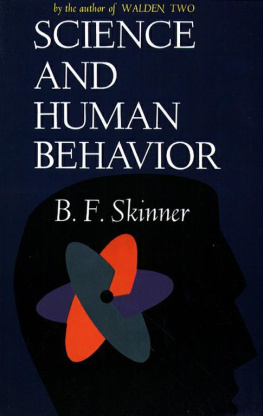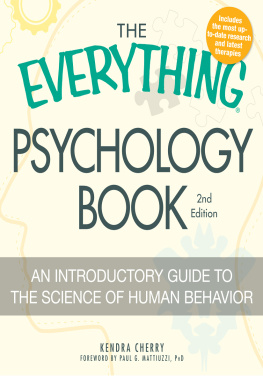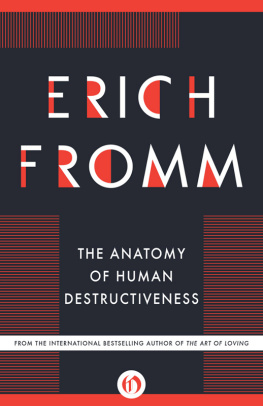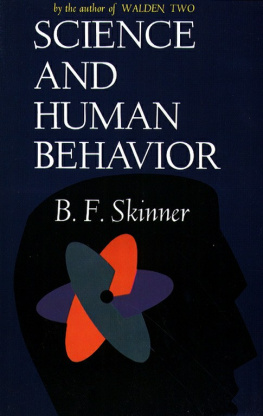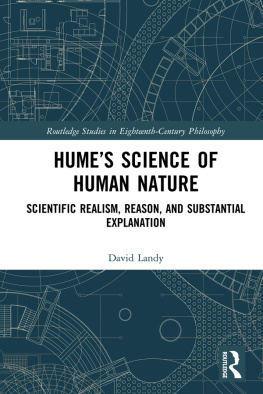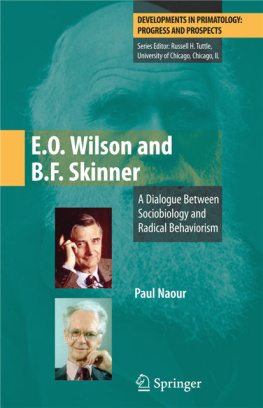Thank you for purchasing this Free Press eBook.
Join our mailing list and get updates on new releases, deals, bonus content and other great books from Free Press and Simon & Schuster. CLICK HERE TO SIGN UP or visit us online to sign up at
eBookNews.SimonandSchuster.com

TABLE OF CONTENTS
To F.S. KELLER
ACKNOWLEDGMENTS
The quotation from Francesco Lana () is to be found on page 212 of the Harvard Educational Review, Fall, 1948, and is used with permission. I am indebted to J. G. Beebe-Center for a helpful reading of the manuscript. I am also grateful for editorial assistance from Mrs. Diana S. Larsen and Miss Dorothy Cohen.
Harvard University
Cambridge, Massachusetts
B.F.S.
SECTION I
THE POSSIBILITY OF A SCIENCE OF HUMAN BEHAVIOR
CHAPTER I
CAN SCIENCE HELP?
THE MISUSE OF SCIENCE
By the middle of the seventeenth century it had come to be understood that the world was enclosed in a sea of air, much as the greater part of it was covered by water. A scientist of the period, Francesco Lana, contended that a lighter-than-air ship could float upon this sea, and he suggested how such a ship might be built. He was unable to put his invention to a practical test, but he saw only one reason why it might not work:
that God will never suffer this Invention to take effect, because of the many consequencies which may disturb the Civil Government of men. For who sees not, that no City can be secure against attack, since our Ship may at any time be placed directly over it, and descending down may discharge Souldiers; the same would happen to private Houses, and Ships on the Sea: for our Ship descending out of the Air to the sails of Sea-Ships, it may cut their Ropes, yea without descending by casting Grapples it may over-set them, kill their men, burn their Ships by artificial Fire works and Fire-balls. And this they may do not only to Ships but to great Buildings, Castles, Cities, with such security that they which cast these things down from a height out of Gun-shot, cannot on the other side be offended by those below.
Lanas reservation was groundless. He had predicted modern air warfare in surprisingly accurate detailwith its paratroopers and its strafing and bombing. Contrary to his expectation, God has suffered his invention to take effect.
And so has Man. The story emphasizes the irresponsibility with which science and the products of science have been used. Mans power appears to have increased out of all proportion to his wisdom. He has never been in a better position to build a healthy, happy, and productive world; yet things have perhaps never seemed so black. Two exhausting world wars in a single half century have given no assurance of a lasting peace. Dreams of progress toward a higher civilization have been shattered by the spectacle of the murder of millions of innocent people. The worst may be still to come. Scientists may not set off a chain reaction to blow the world into eternity, but some of the more plausible prospects are scarcely less disconcerting.
In the face of this apparently unnecessary condition men of good will find themselves helpless or afraid to act. Some are the prey of a profound pessimism. Others strike out blindly in counteraggression, much of which is directed toward science itself. Torn from its position of prestige, science is decried as a dangerous toy in the hands of children who do not understand it. The conspicuous feature of any period is likely to be blamed for its troubles, and in the twentieth century science must play the scapegoat. But the attack is not entirely without justification. Science has developed unevenly. By seizing upon the easier problems first, it has extended our control of inanimate nature without preparing for the serious social problems which follow. The technologies based upon science are disturbing. Isolated groups of relatively stable people are brought into contact with each other and lose their equilibrium. Industries spring up for which the life of a community may be unprepared, while others vanish leaving millions unfit for productive work. The application of science prevents famines and plagues, and lowers death ratesonly to populate the earth beyond the reach of established systems of cultural or governmental control. Science has made war more terrible and more destructive. Much of this has not been done deliberately, but it has been done. And since scientists are necessarily men of some intelligence, they might have been expected to be alert to these consequences.
It is not surprising to encounter the proposal that science should be abandoned, at least for the time being. This solution appeals especially to those who are fitted by temperament to other ways of life. Some relief might be obtained if we could divert mankind into a revival of the arts or religion or even of that petty quarreling which we now look back upon as a life of peace. Such a program resembles the decision of the citizens of Samuel Butlers Erewhon, where the instruments and products of science were put into museumsas vestiges of a stage in the evolution of human culture which did not survive. But not everyone is willing to defend a position of stubborn not knowing. There is no virtue in ignorance for its own sake. Unfortunately we cannot stand still: to bring scientific research to an end now would mean a return to famine and pestilence and the exhausting labors of a slave culture.
SCIENCE AS A CORRECTIVE
Another solution is more appealing to the modern mind. It may not be science which is wrong but only its application. The methods of science have been enormously successful wherever they have been tried. Let us then apply them to human affairs. We need not retreat in those sectors where science has already advanced. It is necessary only to bring our understanding of human nature up to the same point. Indeed, this may well be our only hope. If we can observe human behavior carefully from an objective point of view and come to understand it for what it is, we may be able to adopt a more sensible course of action. The need for establishing some such balance is now widely felt, and those who are able to control the direction of science are acting accordingly. It is understood that there is no point in furthering a science of nature unless it includes a sizable science of human nature, because only in that case will the results be wisely used. It is possible that science has come to the rescue and that order will eventually be achieved in the field of human affairs.
THE THREAT TO FREEDOM
There is one difficulty, however. The application of science to human behavior is not so simple as it seems. Most of those who advocate it are simply looking for the facts. To them science is little more than careful observation. They want to evaluate human behavior as it really is rather than as it appears to be through ignorance or prejudice, and then to make effective decisions and move on rapidly to a happier world. But the way in which science has been applied in other fields shows that something more is involved. Science is not concerned just with getting the facts, after which one may act with greater wisdom in an unscientific fashion. Science supplies its own wisdom. It leads to a new conception of a subject matter, a new way of thinking about that part of the world to which it has addressed itself. If we are to enjoy the advantages of science in the field of human affairs, we must be prepared to adopt the working model of behavior to which a science will inevitably lead. But very few of those who advocate the application of scientific method to current problems are willing to go that far.
Science is more than the mere description of events as they occur. It is an attempt to discover order, to show that certain events stand in lawful relations to other events. No practical technology can be based upon science until such relations have been discovered. But order is not only a possible end product; it is a working assumption which must be adopted at the very start. We cannot apply the methods of science to a subject matter which is assumed to move about capriciously. Science not only describes, it predicts. It deals not only with the past but with the future. Nor is prediction the last word: to the extent that relevant conditions can be altered, or otherwise controlled, the future can be controlled. If we are to use the methods of science in the field of human affairs, we must assume that behavior is lawful and determined. We must expect to discover that what a man does is the result of specifiable conditions and that once these conditions have been discovered, we can anticipate and to some extent determine his actions.
Next page
